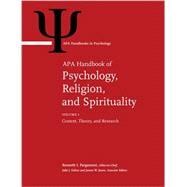The integrative paradigm encourages psychologists to attend to the ways religion and spirituality are expressed not only in individual lives, but also in the lives of couples, families, institutions, communities, and cultures. The handbook documents how the psychology of religion and spirituality is building on its theoretical and empirical foundation to encompass practice.
The chapters in this handbook provide in-depth and varied perspectives of leading scholars and practitioners on the most vital questions in the field:
- What does it mean to say someone is religious or spiritual?
- Why are people religious and spiritual?
- How are people affected by the diverse ways they experience and express their faith?
- How are religion and spirituality shaped and manifested across different ages, ethnicities, religious traditions, and cultures
- How can psychologists distinguish constructive from destructive forms of religion and spirituality?
- How can psychologists integrate religion and spirituality within various models of assessment and treatment?
- At a broader level, how can psychologists integrate knowledge about religion and spirituality more fully into efforts to address the most significant personal, social, and cultural problems of our day?
- In what ways might psychologists of religion and spirituality contribute to the full variety of human institutions — mental health, medical, educational, correctional, military, workplace, and communal?
- And what distinctive contributions can the psychology of religion and spirituality make to mainstream psychological theory, research, and practice?








